![]()
The Words of the Sugiyama Family
|
|
The Words of the Sugiyama Family |
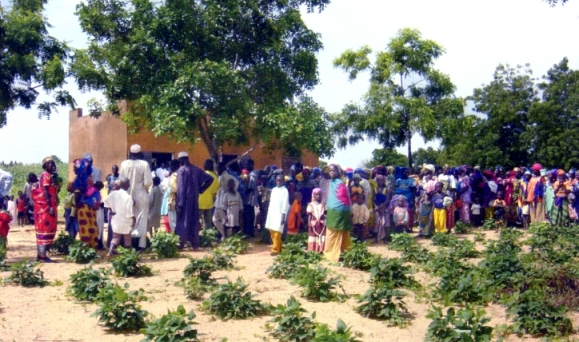
African
national economies have shown recent sharp improvement, but the poor
still need the support of groups such as WFWP. Here, a medical clinic
draws hundreds of locals.
The United Nations Economic and Social Council (ECOSOC) is one of the six main components of the United Nations as described in the UN's founding charter. ECOSOC's work focuses on alleviating the world's economic, social and environmental problems. Currently, more than 3,400 non-governmental organizations (NGOs) work with ECOSOC. These are classified into three categories based on a combination of how much overlap exists between the NGOs' scope of activities and the activities of the UN and how large a geographical area the NGOs are active in. Only those NGOs that work across a wide geographical area and whose work covers most of the issues on the agenda of ECOSOC and its subsidiary bodies qualify for "general consultative status." Worldwide, only 141 NGOs qualify and WFWP International is one of them. It was granted general consultative status and association with the UN Department of Public Information (DPI) in 1997. This high-level status both reflects the quality of work being done on the ground and affords WFWP International greater opportunities to express its views to the UN and to offer advice on areas WFWPI specializes in.
The ECOSOC Committee on NGOs monitors contributions made by NGOs to the work of ECOSOC through a quadrennial report system. In the report, NGOs are required to provide a brief description of all activities that contribute to the work of the UN, including the Millennium Development Goals (MDGs) and other internationally agreed goals. WFWPI's status has been successfully renewed every four years since achieving general consultative status in 1997.
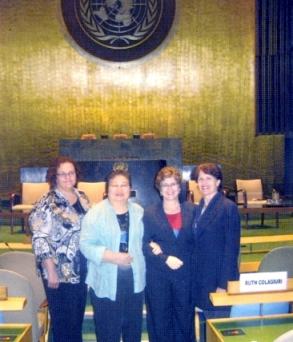
WFWPI
UN representatives at a civil society interactive hearing in the UN
General Assembly Hall.
My testimony on the keys to our success
WFWPI attained ECOSOC general consultative status (and have kept it) based on continuity in maintaining our international service projects.
During my tenure as president of WFWP Japan (1992-1998) I traveled to the Middle East and Africa to promote international service activities during 1993 and 1994. There, I witnessed the grim consequences of civil wars and conflicts and the effects of poverty on people's lives.
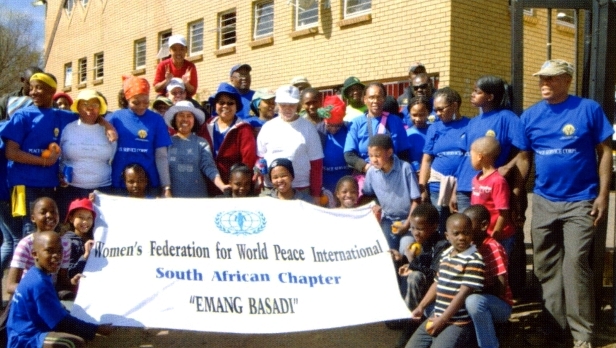
WFWP
South Africa working with a women's human rights group that began in
1986 in Botswana
When WFWP volunteers from Japan went to 160 nations in 1994, True Parents had asked them to find a thousand WFWP members and to meet leaders in each country. Once in their mission countries, the volunteers also witnessed the sad and unfortunate human costs of wars and conflicts. Many people in developing countries are in desperate situations, struggling for basic survival, and Japan is a wealthy and well-developed country. People automatically sought our help. Women and children were the most vulnerable and had suffered tremendously. We witnessed women living on the street, unable to find decent work, and children without a school to study in because of the vast destruction.
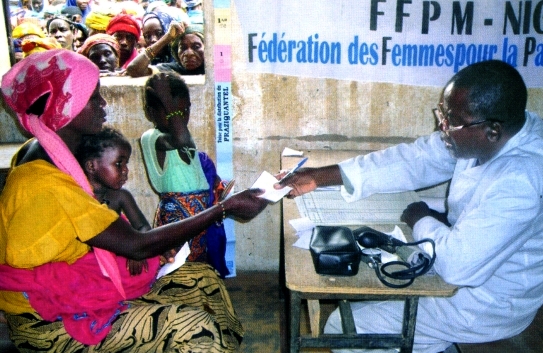
Federation
des Femmes pour la Paix Mondiale (WFWP in French) providing medical
aid, via a mobile clinic, to the needy in Niger.
These dire situations moved our hearts. As members of the same human family, we were willing to do anything we could to help these victims. We could not forget that living for the sake of others is our founders' guiding principle and WFWP's founding spirit. So as the president of WFWP Japan, I approved of the sisters taking action to serve the people as a first step. On that basis, we would be able to reach leaders in the nations later.
In order for WFWP Japan's volunteers to initiate service projects as quickly as possible, we established guidelines on how the overseas volunteers and WFWP Japan could work together. First, WFWP-Japan's headquarters established the Committee on Overseas Service Projects. Those that had volunteered to work overseas visited their appointed countries to conduct needs assessments. They had been instructed to bring back concrete ideas and proposals for projects to be launched in their mission countries. The committee created a system whereby the mission countries were divided among the different WFWP prefectural branches in Japan, through which they would receive financial support. In the beginning, each of Japan's forty-seven prefectures had three or four countries to support. Within some prefectures that have large cities, projects were supported at the city level.
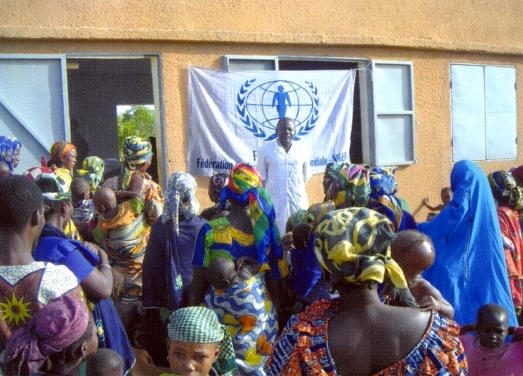
A
doctor teaching women how to prevent Malaria; 90 percent of deaths
from Malaria occur in sub-Saharan Africa.
WFWP-Japan is a bit reduced in size now. It's still the largest among all our national chapters, including Korea, but some sisters withdrew from the mission to begin family life in Korea or elsewhere and some of them became so immersed in church life that they could not continue their projects. That's why we now have forty-five projects.
When I was in Japan, though, WFWP-Japan was very large, twenty thousand members, and each member was paying Y3,000 monthly dues. Everything was run according to the bylaws; thus, those funds were distributed for use by the headquarters and the prefectural chapters.
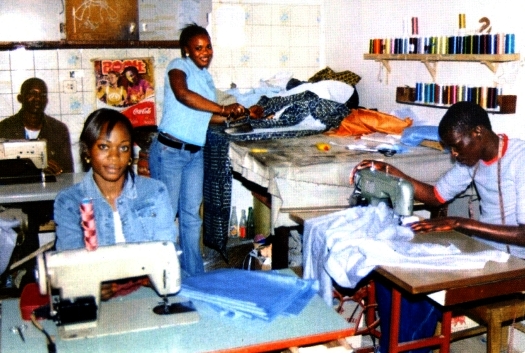
Training
in a tailor's shop run by Jamoo, a WFWP project to help Senegalese
women held themselves. Jamoo means "bringing peace" in the
local Wolof language.
The WFWP headquarters' committee and the prefectural committees reviewed proposals and chose which projects to fund. Fund-raising activities were planned and conducted. Though the needs were great -- much greater than our grassroots efforts could address -- we focused on educational projects with our limited abilities and resources because we believed in the importance of not only giving fish but also teaching how to fish. This is essential to empowering the people we committed ourselves to serve.
Those who began their journey to live for sake of others in 1994, far from their native country, made some remarkable accomplishments possible. Many of these original volunteers are still travelling on this great journey. WFWPI has around ninety chapters in the world. Some WFWPI chapters focus on domestic issues such as AIDS prevention or hold seminars on topics such as family and education. Others raise funds for community service. Some chapters have their own service projects and some cooperate with the Japanese chapter. For more information on ongoing service projects, please see the 2011 Biennial Report, which is based on the report from our Japanese chapter, which is the major chapter doing oversea service projects.
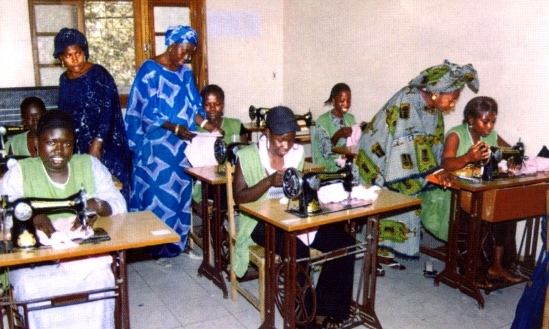
Students
at Jamoo begin by learning the basics of dressmaking.
This is to show that when WFWPI applied to the UN for ECOSOC general consultative status in 1997, it was already a large international NGO operating many service projects such as building and managing schools -- including vocational schools for women and children -- mobile medical service clinics and more in developing nations around the world. These projects target most of the eight Millennium Development Goals (MDGs) introduced after the adoption of the Millennium Declarations during the UN General Assembly in 2000. The overarching target of the goals is to halve extreme poverty by 2015.
WFWP activities contribute especially toward the second Millennium Development Goal, to achieve universal primary education; the third goal, to promote gender equality and empower women; and the sixth goal, to combat HIV / AlDs, malaria and other diseases. Here are a few examples of projects supporting those three goals. Goal 2: Sun of Mozambique Secondary (Junior and Senior High) School in the Republic of Mozambique, founded in 1995. The total number of graduates through 2010 was 7,062, having begun with an enrollment of forty-four in 1995.
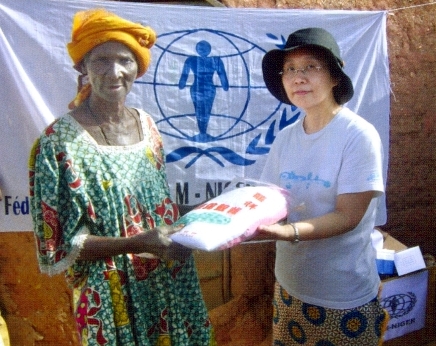
WFWP
donating mosquito nets; the World Health Organization recommends
long-lasting insecticidal mosquito nets to help combat malaria
Goal 3: New Hope Technical Institute (a vocational training school founded in 1996) provides self-help support for women in the Republic of Rwanda. The school offers a one-year course of classes in four trades -- dressmaking, hairdresser and beautician, cooking and embroidery -- in addition to compulsory classes in English, French, Ethics and Business Administration. The total number of graduates through 2010 was 1,368.
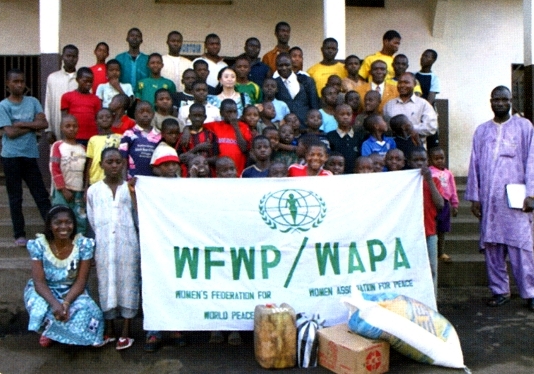
WFWP,
working with a sister organization, to provide goods in Nairobi,
Kenya
Goal 6: Medical Assistance Projects (mobile clinics, medicine boxes and hygiene instruction) in Niger, founded in 1997. Malaria ranks top among major causes of death in Niger. WFWP focused its service on distribution of mosquito nets for malaria prevention in three villages, Kankare Kochina, Kaba Dakura and Gomozo. Seventeen hundred people have received medical exams via a mobile clinic. Twelve hundred mosquito nets were distributed in 2009-2010.
It is not difficult to start a service project, or to perform even one activity. The most important and most difficult part is sustaining the project consistently. This takes massive commitment and sacrifice by those who are directing the projects and those providing physical and financial support over the years.
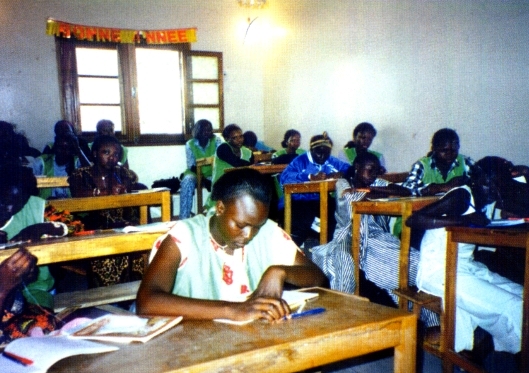
A
WFWP class on morality for young women
As I reflect, I know that I was very lucky. In other words, God guided me to meet the chief of the UN NGO branch when I opened the WFWPI UN office in New York in 1998. Both of us were beginning new assignments and looking for ways to build good partnerships between NGOs and the NGO branch of DESA, which oversees all ECOSOC affiliated NGOs. The chief needed an NGO sponsor for their workshops for NGOs that wished to be affiliated with the UN. I needed guidance from a UN insider, so that WFWPI could be a good and trusted UN NGO. WFWPI provided sponsorship for the NGO workshops and the DESA chief guided us to collaborate well with the UN. WFWPI and the NGO branch cosponsored several conferences, as partners, on important UN agendas. This good cooperation and partnership with the NGO branch continues. The current chief attended WFWP's twentieth anniversary commemoration in Korea this year to offer congratulations on this milestone.
If we work and live according to our founders guiding principle and spirit, literally and exactly, I believe we will realize the UN has been trying to achieve the same goal and ideal. We experience a great deal of joy and true happiness when we witness the joy and happiness of other people as their lives develop and improve for the better through our humble yet sincere handmade offering and service to them.